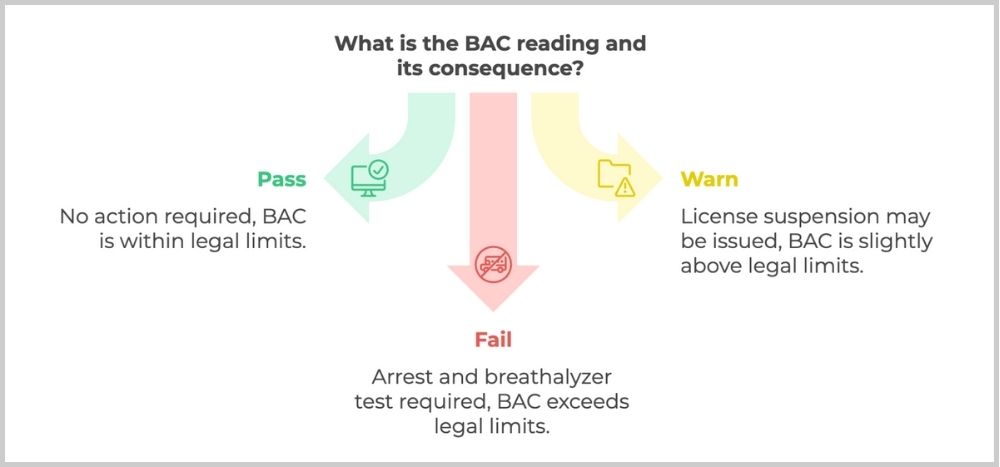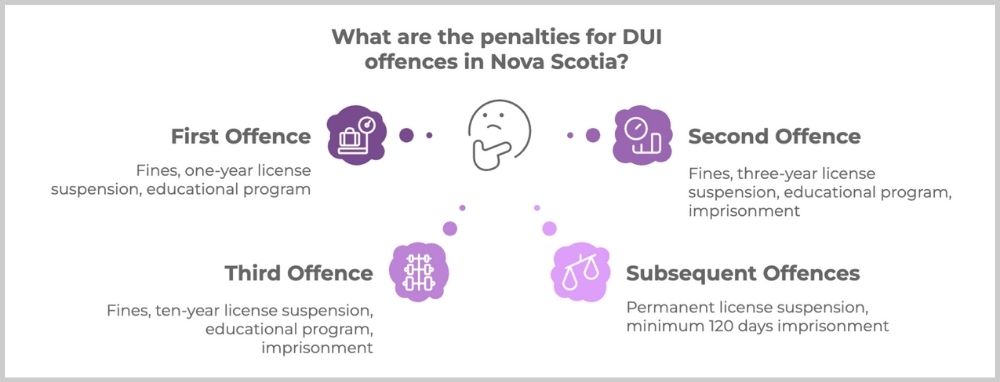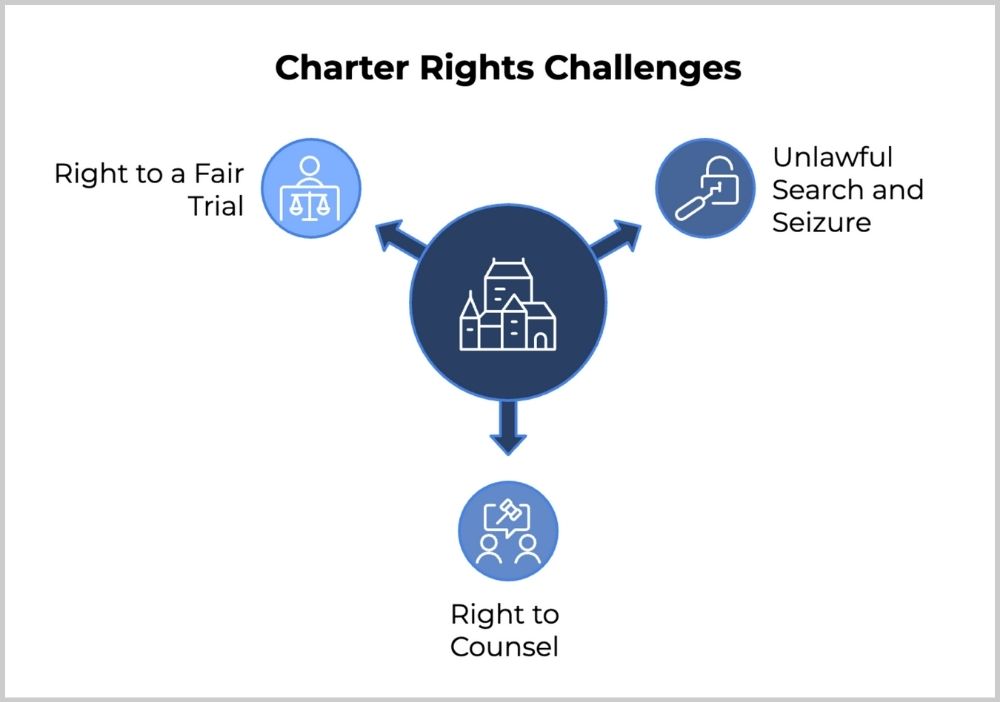How To Beat A DUI In Nova Scotia
Last Updated: November 14, 2024
In Nova Scotia, driving under the influence (DUI) refers to a driver operating a vehicle whilst their judgment to make prudent decisions is impaired due to the influence of alcohol or drugs. It is considered to be a very serious hybrid criminal offence.
The Nova Scotia Motor Vehicle Act along with s.320.14 of the Criminal Code of Canada outlines the offence and its consequences.
The serious nature of a DUI offence and the severe consequences associated with a conviction can have significant impacts on an individual’s social and personal life. Dealing with fines, license suspension, increased insurance rates, possible imprisonment and all the other stresses associated with a potential criminal record can be challenging to deal with on your own. Having an experienced DUI lawyer to help you navigate the legal system and ultimately aid in gaining the best possible outcome for you is very crucial.
Understanding DUI Charges in Nova Scotia
Legal BAC Limits:
The legal blood alcohol concentration (BAC) limit while driving, as per the Nova Scotia Motor Vehicle Act and the Criminal Code, is 80 milligrams of alcohol in 100 millilitres of blood. Where a police officer has reason to believe that you are impaired while driving, they will generally use an SL2 roadside screening device that will give one of three readings, “pass”, “warn”, or “fail”.

- A “pass” reading means that your BAC level does not exceed the limit of 0.08% and thus so long as there are no other violations you will be permitted to leave.
- A “warn” reading means your BAC level was between 0.05% and 0.08%. Upon receiving this reading and depending on whether you have had any similar incidents in the past 10 years, the police officer may issue a 7-day, 15-day, or 30-day license suspension.
- A “fail” reading means that your BAC level has exceeded the legal limit of 0.08%. Following this reading, the police officer will likely arrest you and take you back to the police station where you will be asked to take a breathalyzer test. Notably, it is an offence to refuse to take a breathalyzer test.
Types of DUI Offences:
- Impaired Driving:
Both alcohol and drugs can cause impairment. It is worth noting that prescription and non-prescription medications can also cause impairment and therefore it is always important to confirm with a doctor or pharmacist as to whether it is safe to drive while taking the medication.
A police officer can charge an individual with this offence on a reasonable suspicion based on observations of the driver’s behaviour. For example, displays a lack of motor coordination, reckless driving, unsteady gait, and slurred speech. However, it must still be proven that the driver’s ability to operate the vehicle was impaired due to the use/consumption of drugs and/or alcohol.
- Over 80mg Rule:
A driver may be asked to complete blood alcohol concentration (BAC) testing by a police officer should the officer have reasonable suspicion that the driver is impaired. The police officer will likely use an SL2 roadside screening device to test the BAC level and upon receiving one of the three possible readings (discussed above) the corresponding next steps will be taken.
- Refusal to Provide a Breath or Blood Sample:
It is an offence for a driver to refuse to provide a breath or blood sample after being requested by a police officer. Notably, if a sample is provided but is deemed to be insufficient this charge may ensue.
- Impaired Care and Control:
Should an impaired individual have care and control of a vehicle, regardless of whether the vehicle is in motion, a police officer with reasonable belief that the individual is impaired can still make a charge. It should be noted, that intention to operate the vehicle is not a part of this offence. An example of what this offence may look like is if an intoxicated individual is sitting in the driver’s seat in a parked vehicle with the ignition turned on.
Penalties for a DUI Conviction:
There are several penalties for a DUI offence in Nova Scotia as outlined in s.320.14 of the Criminal Code and the Nova Scotia Motor Vehicle Act. Penalties will vary depending on if it is prosecuted summarily or by indictment, as well as if it is a first or repeat offence. In addition to the penalties discussed below; a DUI conviction will also have other penalties such as a criminal record and higher insurance premiums with the potential of some insurance companies refusing to provide coverage. Depending on if the Crown prosecutes summarily or by indictment, in a case where bodily harm or death results from a DUI offence, then the driver may face the potential of life incarceration.

- First Offence:
- Fines: A fine from $600 up to $2000
- License suspension: Prohibition from driving for one year from the date of conviction. Notably, you will need to pay for license reinstatement, a fee of $124.60. You may also be subject to re-take any of your driving tests; i.e. written tests, road tests, vision tests.
- Educational Program: You may be required to complete an Addiction/Drug Dependency Services assessment program. It should be noted that partaking in this program will be at your own expense for $455.
- Second Offence within a 10-year period:
- Fines: A fine of $600 to $2000
- License Suspension: License suspension for three years from the date of conviction. A fee of $124.60 will be applicable upon reinstatement of the license. You will also be required to re-take your driving tests; i.e. written test, road test and vision tests.
- Educational Program: You will likely be required to complete an Addiction/Drug Dependency Services assessment program at your own cost of $455.
- Imprisonment: You may be incarcerated for at least 14 days.
- Third Offence within a 10-year period:
- Fines: A fine of $600 to $2000
- License Suspension: License suspension for a minimum of 10 years from the date of conviction. Upon license reinstatement, you must pay a fee of $124.60. In addition to the license reinstatement fee you will also be required to re-take driving tests; i.e. written test, road test and vision tests.
- Educational Program: You will be required to complete the Addiction/Drug Dependency Services assessment program, at your own cost of $455.
- Imprisonment: You will likely also face incarceration for at least 90 days.
- Any Subsequent Offences within 10 Years:
- License Suspension: Permanent license suspension.
- Imprisonment: Minimum of 120 days incarceration.
For more information on possible penalties in Nova Scotia please visit here. For guidance on how to beat a DUI charge in Nova Scotia contact one of our diligent lawyers as soon as possible.

Key Strategies for Beating a DUI Charge in Nova Scotia
An experienced and diligent DUI lawyer in Nova Scotia will work to formulate a strong defence by gathering evidence and analyzing the Crown’s case for any shortcomings. Although there are numerous defences for DUI charges in Nova Scotia, the most pertinent will be conditional on the specifics of your case. Below are the most common key strategies:
Challenging the Legality of the Traffic Stop:
This strategy challenges the police officer’s reasons for stopping your vehicle. Should there be no reasonable suspicion or probable cause for stopping your vehicle then it is unlikely that the police officer had any legal grounds for warranting the traffic stop.
Questioning the Accuracy of Breathalyzer and Blood Test Results:
This strategy focuses on challenging the validity of the BAC levels obtained by the breath or blood test. Many factors can skew the accuracy of the breathalyzer/blood test results. For example; if the equipment was faulty, if there were issues in the calibration of the roadside screening device, if the proper procedures were not complied with when administering the test, and any possible issues with maintenance logs.
Furthermore, breathalyzer tests may provide inaccurate results if an individual has any pre-existing medical conditions such as diabetes or Gastroesophageal Reflux Disease (GERD). This is because this type of test measures the quantity of alcohol in the lining of the lungs and is incapable of distinguishing between other chemical substances that are similar; such as the presence of ketone (a substance that is chemically similar to alcohol) and is caused by high blood sugar levels in individuals with diabetes.
Disputing Field Sobriety Test Results:
This strategy relies on disputing the argument that the observed impairments were due to rising BAC levels. Poor test performance may be proved to be the consequence of a number of other factors such as external road conditions, fatigue or physical limitations.
Demonstrating Violations of Your Rights:
This strategy can be utilized where there is a breach of your charter rights. The breach may take various forms before or after your arrest; such as improper detention or a lack of access to legal counsel. Under section 24(2) of the Canadian Charter of Rights and Freedoms, a breach of your charter rights will allow for the exclusion of some or all of the evidence gathered against you by the police.
Challenging Evidence Presented by the Prosecution
Our experienced lawyers will be committed to obtaining the best possible outcome for you. To achieve this goal our lawyers will employ a series of tactics to challenge the Crown Prosecutions case. A lawyer will be able to meticulously review police reports for inconsistencies. By identifying any discrepancies or missing details they will be able to weaken the prosecution’s case.
The prosecution’s case can be further weakened by raising doubts about officer observations by questioning the officer’s interpretation of the driver’s behaviour as a sign of intoxication. Furthermore, having expert witnesses testify can further strengthen a defence case as well as simultaneously weaken the prosecution’s case. For example, a forensic expert may be brought in to analyze BAC results or a medical expert may testify on specific conditions influencing sobriety.
For more information on how a lawyer can aid in challenging the prosecution’s evidence against you and your specific circumstances contact one of our lawyers.
Charter Challenges: Violations of Rights Under the Canadian Charter

Section 24(2) of the Canadian Charter of Rights and Freedoms protects an individual’s charter rights by ensuring that any infringements made by law enforcement will render any evidence that is obtained improperly inadmissible. There are three main infringements that an officer may make:
- Unlawful Search and Seizure:
A challenge that is made on this grounds focuses on disproving the legality of breathalyzer demands or vehicle searches that an officer makes. An officer must have reasonable suspicion to believe that the driver is impaired to be able to make a demand for conducting a test, such as a breathalyzer test. An overreach of this legal ability by an officer can result in some, if not all, of the evidence obtained being dismissed.
- Right to Counsel:
Section 10 of the Charter ensures the right to counsel after being detained or arrested. This challenge is made because the charged individual was denied a reasonable opportunity to contact legal counsel.
- Right to a Fair Trial:
This challenge is made because there were procedural errors and improperly obtained evidence. A likely result will be that some, if not all, improperly obtained evidence will be excluded.
Alternative Options if the Charges Cannot be Dismissed
Our lawyers endeavour to obtain a resolution in your best interest by analyzing your case with the Crown Prosecution. However, should it not be possible to dismiss your charge, we will negotiate for either a reduced charge or an alternative sentence. A reduced charge is when we pursue a lesser charge, such as ‘Careless Driving, a conviction of which does not carry a criminal record. It is also possible to negotiate for an alternative sentence that can take the form of probation, community service, or alcohol education programs.
Hiring a DUI Lawyer in Nova Scotia
It is vital that you do your research when choosing the right DUI lawyer to represent you. Choosing a local lawyer who is familiar with Nova Scotia’s DUI laws and court systems holds numerous benefits. Our team of Nova Scotia lawyers have established relationships with local judges and prosecutors and are acquainted with local law enforcement. Having local legal experts working on your case will prove to be beneficial in navigating through legal processes.
When choosing the right DUI lawyer to represent you it is crucial that you look at specific qualities to ensure that they are best suited to help you gain the best potential outcome. A lawyer’s experience with similar cases to yours, their success rates in dealing with such cases, and their understanding of local legal procedures should all be factors you take into consideration when deciding whom you choose to represent you. A good method to ensure that a lawyer is equipped with the necessary skill set is to evaluate their past cases and client testimonials.
The seriousness of a DUI conviction and navigating through the legal system is a stress that you do not need to shoulder alone. Contact our experienced and committed DUI lawyers to see how we can aid in mitigating the life-long consequences of a DUI charge.
Tips for Protecting Your Rights After a DUI Arrest in Nova Scotia
It is imperative that you take precautions following your arrest to ensure that your rights are protected. It is vital that you refrain from admitting guilt or making an incriminating statement. This means that you should remain silent and wait for legal counsel, both of which you have a right to. Furthermore, you should document the details of your arrest. This means that you maintain track of various factors as part of the arrest process.
These factors can include your interactions with the police, test results such as the result of breathalyzer and blood tests, and any potential witnesses. Possibly the most crucial step you need to take is contacting a DUI lawyer immediately. The sooner that you have legal representation the increased likelihood there is of obtaining a positive outcome.
Conclusion
DUI charges are taken very seriously but having an experienced and dedicated DUI lawyer fighting a DUI in Nova Scotia is essential. There are several key strategies, such as challenging the legality of the traffic stop, questioning the accuracy of tests, disputing field sobriety test results and demonstrating a violation of your rights; that our lawyers will employ to mitigate the consequences of DUI charge.
It is imperative that you book a consultation with one of our DUI lawyers so that we can work to protect your rights and build a strong defence as soon as possible.
Get A Free Consultation
"*" indicates required fields



